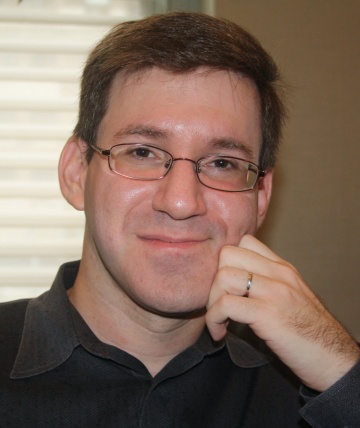Columbia College | Columbia University in the City of New York
Take Five with Charles Ardai ’91

What were you like when you arrived at Columbia?
The first time I came to Columbia, at 16, I was so sure of my plans to be a writer that I skipped over Hamilton Hall entirely, went directly to the Journalism School and asked if I could apply there. They politely encouraged me to maybe try going to college first. By the time I arrived on campus a year later as a freshman, I’d surrendered some of that cockiness. I was in awe of the institution, its hundreds of years of history, its pantheon of impressive alums and professors, its imposing architecture. I was still determined to show the world what I could do, but appreciated a little more that I’d have to pay my dues first.
What do you remember about your first-year living situation?
It’s easy to remember — I was one of the very, very, very few students who commuted rather than living on campus. For Orientation the school found me a room in the Furnald Hall basement to sleep in, but after that I took two buses each day — the M57 crosstown and the M104 up Broadway — to get from home on 52nd and 1st to school and back again. No dorm life for me, no dining halls, no keg parties. I treated school like a job. (One of three I was holding down, because the whole time I was at the College I was also working part time for a publishing company downtown and freelancing for magazines on the side.)
What Core class or experience do you most remember and why?
Lit Hum. I signed up for the earliest morning session there was, which I remember as starting at either 8:15 or 8:30, though that’s kind of hard to believe — maybe it was actually 9:15 or 9:30. But whatever it was, it was definitely early. I would bolt a can of Jolt soda on my way uptown and arrive wide-eyed and ready to grapple with the Great Texts. The other students would straggle in bleary and I’d be wired, my hand up constantly, full of questions and comments. Hermione Granger had nothing on me.
Did you have a favorite spot on campus, and what did you like about it?
When Lerner Hall was still Ferris Booth Hall, there was a piano on the stage in the main auditorium, and neither the auditorium nor the piano was locked, so any day I arrived on campus early, I could sit at the piano and pick out tunes following sheet music I brought with me. The lights were off and I didn’t know how to turn them on, so I had to peer at the sheet music from an inch away to make it out, and in this way I worked my way — badly — through “Night and Day,” “The Continental,” “Fascinating Rhythm,” and so on. God only knows what people passing this darkened auditorium thought was going on.
What, if anything, about your College experience would you do over?
Oh, gosh — everything and nothing. I read so much, learned so much. At one point I could rattle off every Chinese dynasty in order and every physics equation from Newton to Einstein. I could speak French, for heaven’s sake! That’s all gone now, and part of me would love to do a David Denby [’65, JRN’66] and take the whole thing over again, not to do it differently, just to have that wonderful experience a second time. But that sort of learning — crack open the noggin and just keep pouring until it overflows — is a young person’s sport. What remains three decades later — the habits of mind, the habit of questioning, the application of reasoning and introspection to interrogate and unpack and solve problems — is Columbia’s legacy, etched into my brain, and I wouldn’t change a thing about it.
More “Take Five”
- 1 of 31
- ›

